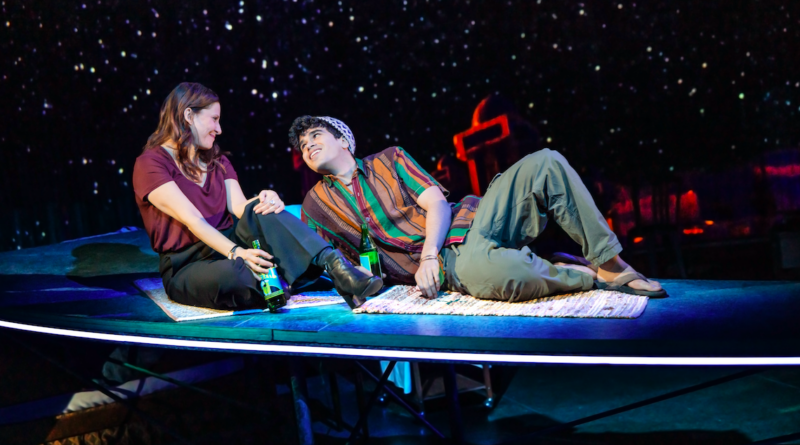INTERVIEW: Abubakr Ali on his journey to Dakar, circa 2000
Photo: Dakar 2000 stars Mia Barron and Abubakr Ali. Photo courtesy of Matthew Murphy / Provided by The Press Room with permission.
Rajiv Joseph’s new two-hander, Dakar 2000, continues for a few more weeks at New York City Center Stage I, courtesy of the Manhattan Theatre Club. The show follows a Peace Corps volunteer named Boubs, played by Abubakr Ali, and a State Department operative named Dina, played by Mia Barron, as they develop an unlikely relationship that is built on a genuine desire to help people and a whole basket of lies. The show, directed by May Adrales, is based off Joseph’s own time in the Peace Corps in Dakar, Senegal.
“This play has gone through so many iterations and rewrites,” Ali said in a recent phone interview about his character of Boubs. “That first draft I read was almost a completely different story. I remember there used to be this thing with Dina like bleeding out of her eyes. It was a whole different world. But there’s something weird about the play. There’s an oddness to it, which I really enjoy. There’s this elevated theatricality that kind of almost crosses genres, which I really connected to. I had so much fun reading that.”
As Joseph, Ali, Barron and Adrales refined the play throughout the rehearsal process, that “oddness” stayed, making its way to the stage as a realistic, but difficult-to-describe feeling that pervades the conversations between Boubs and Dina. He’s idealistic and seemingly volunteering for all the right reasons, while Dina is still in shock about an incident in her life that shook her to her core.
“When I first read it — it was a one-day reading, I was cold-reading it in the morning — and genuinely my eyes were like, ‘What the f— is going on,’ as I was reading it,” Ali said. “Now in the playing of it, I think I have to kind of detach from the genre aspect of it and the twists and the turns of it. I have to just go for the ride and trust that those twists and turns and changes will be evident from an audience point of view, from a storytelling point of view.”
There are, in fact, numerous twists and turns, and it’s a safe bet to state that the audience will not see what’s coming as Dina and Boubs get to know each other. The guiding light for these two characters is Joseph’s own experiences in the Peace Corps in Dakar.
“He has shown us so many pictures of various aspects of the story that he had to live through,” said Ali, who is known for the film Anything’s Possible and TV’s Grendel. “Almost all the characters are based on people who he knew when he was doing that. It’s funny, we did a Peace Corps Night last week, and I think 50 different people that he was in the Peace Corps with flew in from all over the world to come see the play and support it. It was so funny hearing their reactions to little details that normally would not get any reaction, but they’re just such specific details that were so dear to those people. Yeah, so much of this play is based on his experience there.”
Ali added: “Even my character starts the play in a big car crash, and Rajiv was in a big car crash driving the truck, driving supplies down a road to Fatick when he was there. He showed us the stitches he got and the injury he got, and they based almost everything on that. Even the things I’m wearing are based on pictures that he showed all the designers of his time there. Hearing him talk about it, it’s kind of a labor of love from when he was younger doing that. I think it was a very formative time in his life.”
As the play developed, the character of Boubs changed a lot. In the first few drafts, he was loud, boisterous and arrogant, but this brashness didn’t work with the audiences. During previews, they rethought the character as more angelic and sweet, but sometimes in a deceptive way.
“[He’s a] sweet boy who can do no wrong who is in it for all the right reasons, who wants to make a difference in the world, who wants to make the world a better place,” Ali said. “It’s through the play that his relationship to those things and his relationship to his role in the world is altered.”
As the 90 minutes progress, the theatergoers at New York City Center Stage I definitely see differences in how Boubs and Dina see the world. They are not having identical experiences, and they don’t share the same perspective.
“It’s fun to talk about the differences between the two,” he said. “Dina kind of lives in a place where she’s almost accepted the reality of what she does and the repercussions of what she does, and her complicity within that. There’s an acceptance there, a mature acceptance I think, and a very pragmatic acceptance. With Boubs … he has a very different relationship to his actions. I think his complicity within that kind of gnaws at him, and it’s a thing that is constantly hitting him in the head and hitting him in the heart. And he has to cope with it.”
Ali added: “He lies to himself to deal with that complicity. I think they’re different in that sense. She has accepted what she’s doing, and he’s wanting to accept it and genuinely cannot. It constantly beats at him.”
By John Soltes / Publisher / John@HollywoodSoapbox.com
Dakar 2000, featuring Abubakr Ali and Mia Barron, continues through Sunday, March 23, at New York City Center Stage I, courtesy of Manhattan Theatre Club. Click here for more information and tickets.

